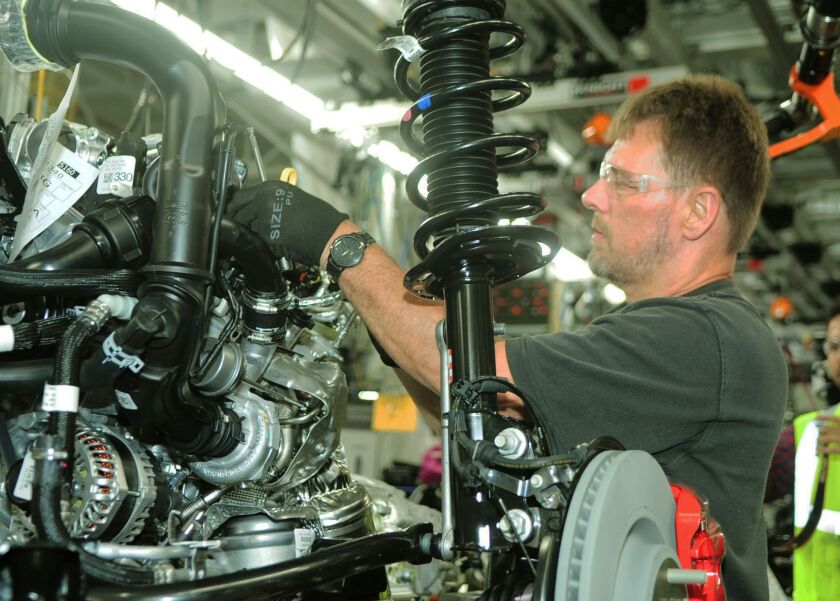On the Southeast Side of Chicago, Ford Motor Co. and its workers are in a mood to show off.
They are on the leading edge of an old industry, having cooperated on a $1 billion expansion that tore out the heavy-equipment heart of the automaker’s Torrence Avenue plant. It closed for just a month during March as construction labor poured in. Then, the assembly-line workers came back to a place retooled for the large sport-utility-vehicles that are key to Ford’s North American success.
During a rare tour of the Chicago plant for reporters, Ford managers greeted workers like old buddies while showing off new break areas and 20-foot wide ceiling fans that kept everybody comfortable on a warm day. Employees smiled and waved, and some spoke highly of the company. Freshly installed welding robots moved in a mechanized chorus line.
And, about once a minute, a vehicle retailing for $40,000 or much more would roll off the line.
But now the company and its roughly 5,800 hourly employees in the Chicago area face another challenge: negotiating a new union contract. It’s likely to be a clash of expectations.
Observers say the United Auto Workers, representing 55,000 people at Ford across the United States, is bent on making up ground it gave up in 2009 during the last recession. Ford won concessions, closed plants and slashed jobs. And it avoided bankruptcy, unlike General Motors and Chrysler.
But it’s also staring at a cost structure that sources say leaves it at a disadvantage compared with non-UAW auto plants in the United States. They say Ford’s labor costs run about $55 an hour vs. $50 at the nonunion competition.
According to industry experts, Ford has zeroed in on that, as well as on health-care benefits that see it cover an estimated 97 percent of employees’ costs. One executive said the UAW workforce pays no deductibles or premiums and only limited co-pays.
Alan “Coby” Millender, Chicago Ford plant chairman for UAW Local 551, isn’t buying the company line. He said the UAW wants Ford to cut its use of temporary workers and get rid of a “progressive” wage scale that allowed the domestic automakers to pay less for new hires.
“We’re prepared as a union to fight for the membership,” Millender said. “That’s one thing that we’ve always done.”
Robert Washington, a body-shop assembler in Chicago, said workers get excited around contract time because it often means a signing bonus — a onetime fattening of their paychecks — is coming. But that always depends on bargaining.
“One thing that Ford is known for is taking care of its own,” Washington said. “Ford doesn’t have to cut costs to sell product because the quality of the product speaks for itself.”
Ford spokeswoman Kelli Felker said of the upcoming talks: “Our focus is reaching a fair agreement with the UAW that allows the company to be more competitive so we can continue to preserve and protect good-paying manufacturing jobs and maintain a track record of investing in our U.S. plants.”
Based on industry data, Ford is the “most American” of domestic auto producers, building in the United States, 82 percent of the vehicles it sells here, though the vehicles carry parts sourced both in the U.S. and around the world.
The current four-year contract expires Sept. 14, along with UAW contracts at General Motors and Fiat Chrysler. Talks are expected to begin in Detroit in the last half of July. The UAW usually doesn’t let contracts run beyond expiration.
UAW national spokesman Brian Rothenberg declined to comment.
The union traditionally follows a strategy called “pattern bargaining” that involves focusing on one automaker in negotiating wages and benefits, then going to the other companies to fall into line. The union has argued its strategy keeps one carmaker from gaining an advantage over the others.
The UAW hasn’t indicated which company it will target this year.
Ford executives are enthused about the improvements at the Chicago plant, work deemed essential to a turnaround. The company’s profit margins are thinner than they were earlier this decade, when it was shaking off the last recession.
The company also knows it needs to spend heavily to develop electric cars and on plant modernization overseas. Ford announced Thursday it’s cutting 12,000 jobs in Europe, nearly 20 percent of the workforce, and closing a third of its 24 plants.
In the United States, the company has exited the traditional four-door sedan business and emphasized premium-priced trucks and SUVs. It still makes the Ford Mustang and a hatchback Focus.
Morningstar analyst David Whiston, who follows Ford’s stock, said, “We remain optimistic about Ford’s long-term prospects because the company now makes cars people actually want to own, instead of vehicles that are purchased only because of heavy incentives.”






